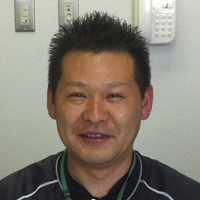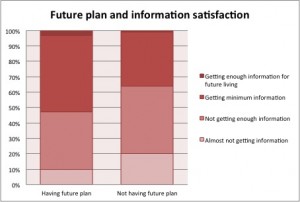The Role and Management of Reconstruction Coordinators

RCF Coordinators in Kamaishi (from R-L): Mikio Yamaguchi, Satomi Yamaguchi and the newly hired Shota Shimokawa
As cities and towns in Tohoku begin taking on the reconstruction of housing and town infrastructure, the importance of community development has become a key focus. This spring, the City of Kamaishi in Iwate Prefecture announced the expansion of the “Reconstruction Coordinator” Program, which piloted successfully in one neighborhood. It is commonly believed that measuring success in community development effort is difficult. We decided to take a look at the Reconstruction Coordinator program and its role, the management tools they use and its impact on community development.
The Role of the Reconstruction Coordinator: Empowering Neighborhood Activities
The pilot program took place in the town of Touni, located in the southern part of Kamaishi. The coastal area of the Town is primarily made up of fishing villages, and six out of the seven neighborhoods suffered significant damages from the tsunami. The current population of the town is just over 2000.
In June 2012, RCF Reconstruction Support Team (“RCF”), a non-governmental organization based in Tokyo, placed their Reconstruction Coordinators in Touni to provide support for the community development necessary for the post-quake reconstruction effort.
 Reconstruction Coordinators have two primary roles: the first is to empower neighborhood activities. Their support covers a wide range of community needs, from organizing weed removal, hosting middle school track meets and other local events to documenting the disaster memories and shepherding through grant application processes. The local events help re-connect the residents [spread apart by the disaster] and also bring visitors from outside, resulting in the revitalization of the neighborhood.
Reconstruction Coordinators have two primary roles: the first is to empower neighborhood activities. Their support covers a wide range of community needs, from organizing weed removal, hosting middle school track meets and other local events to documenting the disaster memories and shepherding through grant application processes. The local events help re-connect the residents [spread apart by the disaster] and also bring visitors from outside, resulting in the revitalization of the neighborhood.
“We prioritize what the locals want and offer ideas and logistical support to make it happen” according to Mikio Yamaguchi, who has been working in Touni since July 2012 as a RCF Coordinator. The primary reason why the Coordinators have won the trust of the locals may not only be the actual services they provided, but rather, the way they go about it by assuming a support role with an awareness that they are and will remain the outsiders.
Unique Role The Outsiders can take
The Coordinators also play a key role as facilitators in the reconstruction planning process. After arriving in Touni, the RCF Coordinators recognized early on that many residents were disappointed with the way the local government officials communicated as land use and public housing plans were still unclear. The situation was far from ideal in developing a reconstruction plan that truly meets the residents’ needs, so RCF Coordinators began organizing community meetings to facilitate more involvement. They proposed to neighborhood associations and community leaders that they needed to meet among themselves ahead of public hearings in preparation. The Coordinators used these meetings to ensure that the internal consensus is build around the long term visions and goals, so that the leadership can voice a unified view and represent the community effectively to the government at the public hearings.
According to Yamaguchi, “As a neutral outsider, we can navigate through the complex web of existing relationships and facilitate dialogues and help arrive at a solution”. Being an outsider may bring a unique advantage when acting as a Coordinator. The impact of their facilitation effort was evident at the public hearing in November where attendance was high and the participants applauded the outcome.
Identifying and Nurturing the Local Leadership
RCF’s ultimate goal, according to its President, Retz Fujisawa, is to “Identify the local group(s) that are capable of leadership to represent the whole community”. Each locality has a number of neighborhood groups and organizations and it is critical to have a clearly defined and well recognized leadership among them. Once someone is recognized as a trusted and accepted leader who can speak on behalf of the entire community, that person becomes a central point of contact for the government when they need to reach out and engage the community. In turn, the community now has a singular voice to effectively channel its view– the kind of relationship that can expedite the reconstruction planning.
“We realized that the real issue is not lack of communication between the residents and the government, as commonly believed. Rather, it is communication among the residents ” says Fujisawa. The Reconstruction Coordinators are serving a key function of facilitating communication and increased engagement within the community as they organize discussion forums and local events.
(Translation by Fumio Ichikawa)
Tweet




